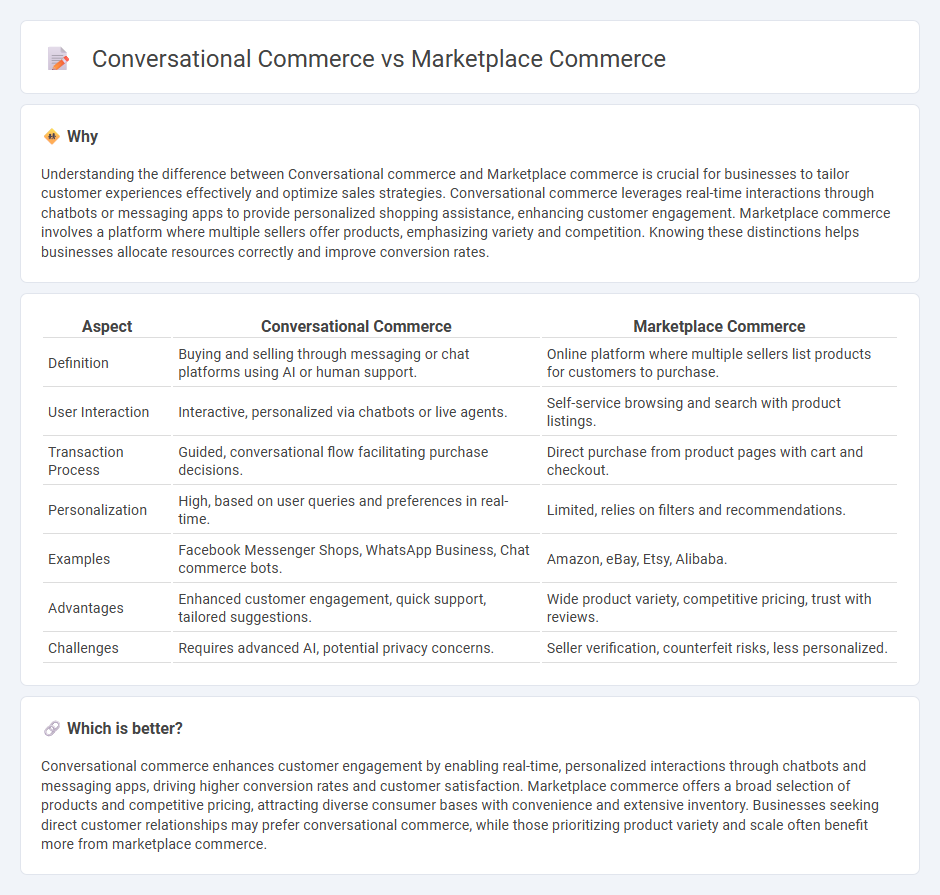
Conversational commerce leverages real-time communication channels like chatbots and messaging apps to facilitate personalized shopping experiences, enhancing customer engagement and increasing conversion rates. Marketplace commerce, on the other hand, centralizes diverse products from multiple sellers on a single platform, offering extensive variety and competitive pricing to buyers. Discover how these two dynamic models transform online retail by exploring their unique advantages and applications.
Why it is important
Understanding the difference between Conversational commerce and Marketplace commerce is crucial for businesses to tailor customer experiences effectively and optimize sales strategies. Conversational commerce leverages real-time interactions through chatbots or messaging apps to provide personalized shopping assistance, enhancing customer engagement. Marketplace commerce involves a platform where multiple sellers offer products, emphasizing variety and competition. Knowing these distinctions helps businesses allocate resources correctly and improve conversion rates.
Comparison Table
| Aspect | Conversational Commerce | Marketplace Commerce |
|---|---|---|
| Definition | Buying and selling through messaging or chat platforms using AI or human support. | Online platform where multiple sellers list products for customers to purchase. |
| User Interaction | Interactive, personalized via chatbots or live agents. | Self-service browsing and search with product listings. |
| Transaction Process | Guided, conversational flow facilitating purchase decisions. | Direct purchase from product pages with cart and checkout. |
| Personalization | High, based on user queries and preferences in real-time. | Limited, relies on filters and recommendations. |
| Examples | Facebook Messenger Shops, WhatsApp Business, Chat commerce bots. | Amazon, eBay, Etsy, Alibaba. |
| Advantages | Enhanced customer engagement, quick support, tailored suggestions. | Wide product variety, competitive pricing, trust with reviews. |
| Challenges | Requires advanced AI, potential privacy concerns. | Seller verification, counterfeit risks, less personalized. |
Which is better?
Conversational commerce enhances customer engagement by enabling real-time, personalized interactions through chatbots and messaging apps, driving higher conversion rates and customer satisfaction. Marketplace commerce offers a broad selection of products and competitive pricing, attracting diverse consumer bases with convenience and extensive inventory. Businesses seeking direct customer relationships may prefer conversational commerce, while those prioritizing product variety and scale often benefit more from marketplace commerce.
Connection
Conversational commerce leverages real-time messaging platforms to facilitate personalized shopping experiences, directly driving traffic and sales on marketplace commerce platforms. Marketplace commerce benefits from conversational tools by enhancing customer engagement, simplifying product discovery, and automating transactions within integrated chat environments. This synergy boosts conversion rates and customer satisfaction by merging seamless communication with expansive product catalogs.
Key Terms
Platform
Marketplace commerce platforms centralize product listings from multiple vendors, providing a broad selection and streamlined purchase process through a single digital storefront. Conversational commerce leverages messaging apps and AI-driven chatbots to facilitate personalized shopping experiences, allowing users to interact and complete transactions via natural language conversations. Explore how each platform optimizes customer engagement and drives sales in evolving digital markets.
Chatbot
Marketplace commerce integrates multiple sellers on a single platform, facilitating product discovery and comparison through traditional browsing interfaces. Conversational commerce leverages chatbots to provide personalized shopping experiences, guiding users through product recommendations and seamless transactions via natural language interaction. Explore how chatbots revolutionize customer engagement and sales conversion by blending AI with commerce.
Customer engagement
Marketplace commerce centralizes product listings and transactions, enabling customers to explore diverse offerings within a unified platform, which streamlines purchase decisions and enhances user experience. Conversational commerce leverages AI-driven chatbots and messaging apps to facilitate personalized interactions, providing real-time assistance and tailored recommendations that boost customer engagement and satisfaction. Explore how integrating these commerce models can elevate your customer engagement strategies.
Source and External Links
Adobe Commerce Marketplace - Experience League - Adobe Commerce Marketplace is a curated application store offering merchants verified extensions and tools to extend their online stores, ensuring quality and security through an extensive review process.
Adobe Commerce Marketplace - A platform where merchants can browse thousands of free and premium Magento extensions and themes to enhance their online store's functionality.
Commerce Marketplace - Salesforce Help - Commerce Marketplace in Salesforce helps connect Salesforce Commerce storefronts with the Commerce Marketplace app, managing personal and seller data securely within the Salesforce ecosystem.
 dowidth.com
dowidth.com